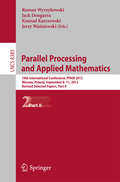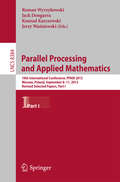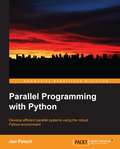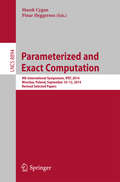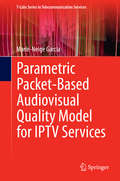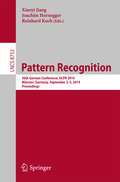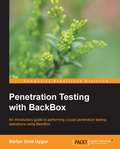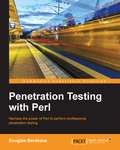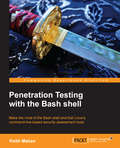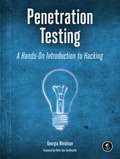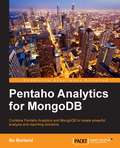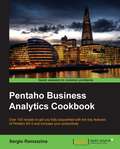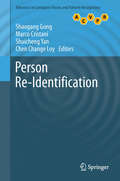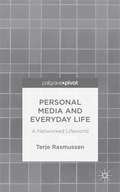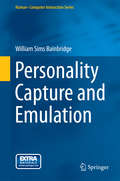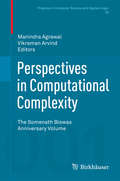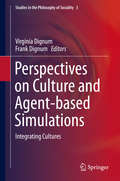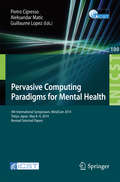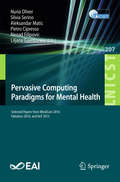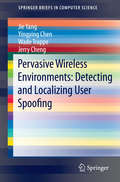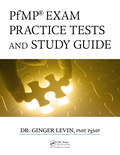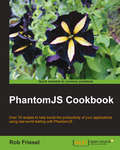- Table View
- List View
Parallel Processing and Applied Mathematics
by Jerzy Waśniewski Roman Wyrzykowski Jack Dongarra Konrad KarczewskiThis two-volume-set (LNCS 8384 and 8385) constitutes the refereed proceedings of the 10th International Conference of Parallel Processing and Applied Mathematics, PPAM 2013, held in Warsaw, Poland, in September 2013. The 143 revised full papers presented in both volumes were carefully reviewed and selected from numerous submissions. The papers cover important fields of parallel/distributed/cloud computing and applied mathematics, such as numerical algorithms and parallel scientific computing; parallel non-numerical algorithms; tools and environments for parallel/distributed/cloud computing; applications of parallel computing; applied mathematics, evolutionary computing and metaheuristics.
Parallel Processing and Applied Mathematics
by Jerzy Waśniewski Roman Wyrzykowski Jack Dongarra Konrad KarczewskiThis two-volume-set (LNCS 8384 and 8385) constitutes the refereed proceedings of the 10th International Conference of Parallel Processing and Applied Mathematics, PPAM 2013, held in Warsaw, Poland, in September 2013. The 143 revised full papers presented in both volumes were carefully reviewed and selected from numerous submissions. The papers cover important fields of parallel/distributed/cloud computing and applied mathematics, such as numerical algorithms and parallel scientific computing; parallel non-numerical algorithms; tools and environments for parallel/distributed/cloud computing; applications of parallel computing; applied mathematics, evolutionary computing and metaheuristics.
Parallel Programming with Python
by Jan PalachA fast, easy-to-follow and clear tutorial to help you develop Parallel computing systems using Python. Along with explaining the fundamentals, the book will also introduce you to slightly advanced concepts and will help you in implementing these techniques in the real world. If you are an experienced Python programmer and are willing to utilize the available computing resources by parallelizing applications in a simple way, then this book is for you. You are required to have a basic knowledge of Python development to get the most of this book.
Parameterized and Exact Computation
by Marek Cygan Pinar HeggernesThis book constitutes the thoroughly refereed post-conference proceedings of the 9th International Symposium on Parameterized and Exact Computation, IPEC 2014, in Wroclaw, Poland, in September 2014. The 27 revised full papers presented together with one invited paper were carefully reviewed and selected from 42 submissions. The topics addressed cover research in all aspects of parameterized/exact algorithms and complexity including but are not limited to new techniques for the design and analysis of parameterized and exact algorithms, fixed-parameter tractability results; parameterized complexity theory, relationship between parameterized complexity and traditional complexity classifications; applications of parameterized and exact exponential-time computation; and implementation issues of parameterized and exact exponential-time algorithms.
Parametric Packet-based Audiovisual Quality Model for IPTV services
by Marie-Neige GarciaThis volume presents a parametric, packet-based, comprehensive model to measure and predict the audiovisual quality of Internet Protocol Television services as it is likely to be perceived by the user. The comprehensive model is divided into three sub-models referred to as the audio model, the video model, and the audiovisual model. The audio and video models take as input a parametric description of the audiovisual processing path, and deliver distinct estimates for both the audio and video quality. These distinct estimates are eventually used as input data for the audiovisual model. This model provides an overall estimate of the perceived audiovisual quality in total. The parametric description can be used as diagnostic information. The quality estimates and diagnostic information can be practically applied to enhance network deployment and operations. Two applications come to mind in particular: Network planning and network service quality monitoring. The audio model can be used indifferently for both applications. However, two variants of the video model have been developed in order to address particular needs of the applications mentioned above. The comprehensive model covers effects due to resolution, coding, and IP-packet loss in case of RTP-type transport. The model applied to quality monitoring is standardized under the ITU-T Recommendations P. 1201 and P. 1201. 2.
Pattern Recognition
by Xiaoyi Jiang Joachim Hornegger Reinhard KochThis book constitutes the refereed proceedings of the 36th German Conference on Pattern Recognition, GCPR 2014, held in Münster, Germany, in September 2014. The 58 revised full papers and 8 short papers were carefully reviewed and selected from 153 submissions. The papers are organized in topical sections on variational models for depth and flow, reconstruction, bio-informatics, deep learning and segmentation, feature computation, video interpretation, segmentation and labeling, image processing and analysis, human pose and people tracking, interpolation and inpainting.
Penetration Testing with BackBox
by Stefan Umit UygurThis practical book outlines the steps needed to perform penetration testing using BackBox. It explains common penetration testing scenarios and gives practical explanations applicable to a real-world setting. This book is written primarily for security experts and system administrators who have an intermediate Linux capability. However, because of the simplicity and user-friendly design, it is also suitable for beginners looking to understand the principle steps of penetration testing.
Penetration Testing with Perl
by Douglas BerdeauxIf you are an expert Perl programmer interested in penetration testing or information security, this guide is designed for you. However, it will also be helpful for you even if you have little or no Linux shell experience.
Penetration Testing with the Bash shell
by Keith MakanAn easy-to-understand, step-by-step practical guide that shows you how to use the Linux Bash terminal tools to solve information security problems. If you are a penetration tester, system administrator, or developer who would like an enriching and practical introduction to the Bash shell and Kali Linux command-line-based tools, this is the book for you.
Penetration Testing: A Hands-On Introduction to Hacking
by Georgia WeidmanPenetration testers simulate cyber attacks to find security weaknesses in networks, operating systems, and applications. Information security experts worldwide use penetration techniques to evaluate enterprise defenses.In Penetration Testing, security expert, researcher, and trainer Georgia Weidman introduces you to the core skills and techniques that every pentester needs. Using a virtual machine–based lab that includes Kali Linux and vulnerable operating systems, you’ll run through a series of practical lessons with tools like Wireshark, Nmap, and Burp Suite. As you follow along with the labs and launch attacks, you’ll experience the key stages of an actual assessment—including information gathering, finding exploitable vulnerabilities, gaining access to systems, post exploitation, and more.Learn how to:–Crack passwords and wireless network keys with brute-forcing and wordlists–Test web applications for vulnerabilities–Use the Metasploit Framework to launch exploits and write your own Metasploit modules–Automate social-engineering attacks–Bypass antivirus software–Turn access to one machine into total control of the enterprise in the post exploitation phaseYou’ll even explore writing your own exploits. Then it’s on to mobile hacking—Weidman’s particular area of research—with her tool, the Smartphone Pentest Framework.With its collection of hands-on lessons that cover key tools and strategies, Penetration Testing is the introduction that every aspiring hacker needs.
Pentaho Analytics for MongoDB
by Bo BorlandThis is an easy-to-follow guide on the key integration points between Pentaho and MongoDB. This book employs a practical approach designed to have Pentaho configured to talk to MongoDB early on so that you see rapid results. This book is intended for business analysts, data architects, and developers new to either Pentaho or MongoDB who want to be able to deliver a complete solution for storing, processing, and visualizing data. It's assumed that you will already have experience defining data requirements needed to support business processes and exposure to database modeling, SQL query, and reporting techniques.
Pentaho Business Analytics Cookbook
by Sergio RamazzinaThis practical guide contains a wide variety of recipes, taking you through all the topics you need to quickly familiarize yourself with Pentaho and extend your Pentaho skillset. If you are involved in daily activities using Pentaho Business Analytics platform, this is the book for you. It is a good companion to get you quickly acquainted with everything you need to increase your productivity with the platform. We assume basic familiarity with Pentaho, data warehouse design and SQL, HTML, and XML.
Performance Analysis of Complex Networks and Systems
by Piet Van MieghemThis rigorous, self-contained book describes mathematical and, in particular, stochastic and graph theoretic methods to assess the performance of complex networks and systems. It comprises three parts: the first is a review of probability theory; Part II covers the classical theory of stochastic processes (Poisson, Markov and queueing theory), which are considered to be the basic building blocks for performance evaluation studies; Part III focuses on the rapidly expanding new field of network science. This part deals with the recently obtained insight that many very different large complex networks – such as the Internet, World Wide Web, metabolic and human brain networks, utility infrastructures, social networks – evolve and behave according to general common scaling laws. This understanding is useful when assessing the end-to-end quality of Internet services and when designing robust and secure networks. Containing problems and solved solutions, the book is ideal for graduate students taking courses in performance analysis.
Performing Beauty in Participatory Art and Culture (Routledge Advances in Art and Visual Studies)
by Falk HeinrichThis book investigates the notion of beauty in participatory art, an interdisciplinary form that necessitates the audience’s agential participation and that is often seen in interactive art and technology-driven media installations. After considering established theories of beauty, for example, Plato, Alison, Hume, Kant, Gadamer and Santayana through to McMahon and Sartwell, Heinrich argues that the experience of beauty in participatory art demands a revised notion of beauty; a conception that accounts for the performative and ludic turn within various art forms and which is, in a broader sense, a notion of beauty suited to a participatory and technology-saturated culture. Through case studies of participatory art, he provides an art-theoretical approach to the concept of performative beauty; an approach that is then applied to the wider context of media and design artefacts.
Person Re-Identification
by Shaogang Gong Marco Cristani Shuicheng Yan Chen Change LoyThe first book of its kind dedicated to the challenge of person re-identification, this text provides an in-depth, multidisciplinary discussion of recent developments and state-of-the-art methods. Features: introduces examples of robust feature representations, reviews salient feature weighting and selection mechanisms and examines the benefits of semantic attributes; describes how to segregate meaningful body parts from background clutter; examines the use of 3D depth images and contextual constraints derived from the visual appearance of a group; reviews approaches to feature transfer function and distance metric learning and discusses potential solutions to issues of data scalability and identity inference; investigates the limitations of existing benchmark datasets, presents strategies for camera topology inference and describes techniques for improving post-rank search efficiency; explores the design rationale and implementation considerations of building a practical re-identification system.
Personal Media and Everyday Life: A Networked Lifeworld
by Terje RasmussenThis book addresses the widespread use of digital personal media in daily life. With a sociological and historical perspective, it explores the media-enhanced individualization and rationalization of the lifeworld, discussing the dramatic mediatization of daily life and calling on theorists such as McLuhan, Habermas and Goffman.
Personality Capture and Emulation
by William Sims BainbridgePersonality Capture and Emulation is the gateway to an amazing future that actually may be achieved, enabling the preservation and simulation of human personalities at progressively higher levels of fidelity. This challenge is no longer the province merely of uninhibited visionaries, but has become a solid field of research, drawing upon a wide range of information technologies in human-centered computing and cyber-human systems. Even at modest levels of accomplishment, research in this emerging area requires convergence of cognitive, social, and cultural sciences, in cooperation with information engineering and artificial intelligence, thus stimulating new multidisciplinary perspectives. Therefore this book will inspire many specific research and development projects that will produce their own valuable outcomes, even as the totality of the work moves us closer to a major revolution in human life. Will it ever really be possible to transfer a human personality at death to a technology that permits continued life? Or will people come to see themselves as elements in a larger socio-cultural system, for which a societal information system can provide collective immortality even after the demise of individuals? A large number and variety of pilot studies and programming projects are offered as prototypes for research that innovators in many fields may exploit for the achievement of their own goals. Together, they provide an empirical basis to strengthen the intellectual quality of several current debates at the frontiers of the human and information sciences.
Perspectives in Computational Complexity
by Manindra Agrawal Vikraman ArvindThis book brings together contributions by leading researchers in computational complexity theory written in honor of Somenath Biswas on the occasion of his sixtieth birthday. They discuss current trends and exciting developments in this flourishing area of research and offer fresh perspectives on various aspects of complexity theory. The topics covered include arithmetic circuit complexity, lower bounds and polynomial identity testing, the isomorphism conjecture, space-bounded computation, graph isomorphism, resolution and proof complexity, entropy and randomness. Several chapters have a tutorial flavor. The aim is to make recent research in these topics accessible to graduate students and senior undergraduates in computer science and mathematics. It can also be useful as a resource for teaching advanced level courses in computational complexity.
Perspectives on Culture and Agent-based Simulations
by Virginia Dignum Frank DignumThis volume analyses, from a computational point of view, how culture may arise, develop and evolve through time. The four sections in this book examine and analyse the modelling of culture, group and organisation culture, culture simulation, and culture-sensitive technology design. Different research disciplines have different perspectives on culture, making it difficult to compare and integrate different concepts and models of culture. By taking a computational perspective this book nevertheless enables the integration of concepts that play a role in culture, even though they might originate from different disciplines. Culture is usually regarded as something vague and qualitative and thus difficult to deal with in a computational and formal setting. Taking a computational approach to culture thus encompasses a twofold risk: taking a too simplistic approach to cultural influence on behaviour; or trying to capture too much, hence not leading to useful computational tools. However, the approaches and insights in this collection show how different perspectives by leading researchers described in thirteen chapters still can form a coherent picture. The book thus illustrates the potential of using computing systems to better understand culture. By describing methods, theories and concrete application results about the integration of cultural aspects into computer systems, this book provides inspiration to researchers of all disciplines alike and presents the start of an interdisciplinary dialogue on culture.
Pervasive Computing Paradigms for Mental Health
by Aleksandar Matic Guillaume Lopez Pietro CipressoThis book constitutes revised post-proceedings of the 4th International Symposium on Pervasive Computing Paradigms for Mental Health, MindCare 2014, held in Tokyo, Japan, in May 2014. The 11 full and 5 short papers presented were carefully reviewed and selected from 26 submissions for inclusion in the proceedings. The papers are organized in topical sections on recognition and assessment, mental health management, improving communication, depression, and self-applied treatments.
Pervasive Computing Paradigms for Mental Health: 4th International Symposium, Mindcare 2014, Tokyo, Japan, May 8-9, 2014, Revised Selected Papers (Lecture Notes of the Institute for Computer Sciences, Social Informatics and Telecommunications Engineering #100)
by Liljana Gavrilovska Silvia Serino Aleksandar Matic Pietro Cipresso Nenad Filipovic Nuria OliverThis book constitutes the refereed proceedings of the 6th International Symposium on Pervasive Computing Paradigms for Mental Health, MindCare 2016, held in Barcelona, Spain, in November 2016, and the Second International Conference of Future Access Enablers of Ubiquitous and Intelligent Infrastructures, Fabulous 2016, Belgrade, Serbia, October 24-26, 2016, and the Third International Conference on Interoperability in IoT, IIoT 2015, Rome, Italy, October 26-27, 2015. The 24 papers were selected from 32 submissions. MindCare presents technologies in favor of maintaining and improving psychological well-being. Fabulous presents broad areas of future wireless networks, ambient and assisted living and smart infrastructures in order to interact, exchange ideas, expertise, experience and know-how. And finally IIoT presents tools and services in home automation and industrial service.
Pervasive Wireless Environments: Detecting and Localizing User Spoofing
by Jie Yang Yingying Chen Wade Trappe Jerry ChengThis Springer Brief provides a new approach to prevent user spoofing by using the physical properties associated with wireless transmissions to detect the presence of user spoofing. The most common method, applying cryptographic authentication, requires additional management and computational power that cannot be deployed consistently. The authors present the new approach by offering a summary of the recent research and exploring the benefits and potential challenges of this method. This brief discusses the feasibility of launching user spoofing attacks and their impact on the wireless and sensor networks. Readers are equipped to understand several system models. One attack detection model exploits the spatial correlation of received signal strength (RSS) inherited from wireless devices as a foundation. Through experiments in practical environments, the authors evaluate the performance of the spoofing attack detection model. The brief also introduces the DEMOTE system, which exploits the correlation within the RSS trace based on each device's identity to detect mobile attackers. A final chapter covers future directions of this field. By presenting complex technical information in a concise format, this brief is a valuable resource for researchers, professionals, and advanced-level students focused on wireless network security.
PfMP Exam Practice Tests and Study Guide (Best Practices in Portfolio, Program, and Project Management)
by PMP, PgMP, LevinRecognizing the importance of portfolio management, the Project Management Institute (PMI) has launched a new certification entitled the Portfolio Management Professional (PfMP). PfMP Exam Practice Tests and Study Guide is the most comprehensive resource available to help you prepare for and pass the PfMP certification exam. It provides covera
PgMP Exam Challenge! (ESI International Project Management Series #17)
by Ginger Levin PMP PgMP J. LeRoy Ward PMP PgMPUp to date with the third edition of PMI's Program Management Standard, The PgMP Exam Challenge! contains more than 300 practice questions to help readers hone their knowledge and test their skills. It covers all five of the program management domains: Strategic Program Management, Program Management Life Cycle, Benefits Management, Stakeholder Management, and Governance. It also examines all of the sub domains of the lifecycle domain. With an easy-to-use format, this is an ideal resource for those preparing to take the PgMP exam.
PhantomJS Cookbook
by Rob FrieselA task-based guide that provides solutions to real-world test automation problems. This book is intended for web development professionals who want to integrate PhantomJS into their development and testing workflows. If you are a web developer looking to run automated unit tests while you work, or perhaps you are a QA engineer looking for a fast test automation utility, then this book is perfect for you. Some prior knowledge of JavaScript would be helpful.
